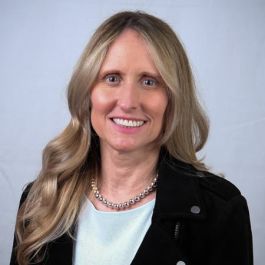“What would she do in this situation?”
It’s a question that Katie Franks — referring to one of her role models and colleagues — often asks herself. As COO and CMO at Magma Capital Funds, Franks credits the successful and organic career journey she’s had to the people who have helped define it.
While each person’s journey is their own, women leaders know firsthand how much support systems matter along the way. That’s why April Pongitory, Ed.D. is thinking about the next generation of leaders and offering mentorship and sponsorship to support them.
“I am a cheerleader for their accomplishments and a listening ear when they experience disappointment or frustration,” Pongitory said. Providing guidance with compassion allows the vice president of client services at Fusion Risk Management to lead with both her head and her heart, tapping into what makes us all human.
For some women — especially those in male-dominated industries like tech — having someone to look up to isn’t easy. In those cases, certain leaders fill in the gap by working to become the role model they needed. Tracy Delgado, Pareto Intelligence’s director of product, operations and delivery management, is one of them: “I spent a lot of time reading books and enrolling in leadership trainings to become the type of leader I wish I’d had early on in my career.”
The story goes a little differently for almost every woman in a leadership role, which is why Built In Chicago sat down with Franks, Pongitory, and Delgado — plus leaders from PEAK6, Belvedere Training, Litera and Bringg — to learn about their supportive and motivational journeys.
Tell us about your career journey. What were some of the defining moments that brought you to where you are today?
I spent the early years of my career in a variety of positions within the financial services industry, which provided a solid foundation to shift into financial technology. My first position as a business analyst in fintech enabled me to leverage industry knowledge while quickly gaining proficiency in the technology space. The leader of that team became my first true mentor and started my leadership journey by demonstrating effective practices and building trust every day.
Several years later, I was approached by the leader of another department with a proposal for a new position she had created for me based on my performance delivering a highly-visible client project. She became my career sponsor, ultimately propelling me into my first leadership role. I remain grateful for her guidance, mentorship and trust. From that moment, I have paid it forward by advocating for other women to pursue leadership roles in and out of the technology field, providing encouragement and acting as a career sponsor and mentor. At this point in my career, I am focusing on the next generation of leaders and providing them with strategies and tools to be successful on their own journeys.
Strong leaders provide their teams with strategies to overcome roadblocks and reframe mistakes as learning opportunities.”
As a leader, what have you done to empower and uplift the women around you?
I frequently provide mentorship and career sponsorship to other women who want to become leaders, as well as those already on their leadership journey. I am a cheerleader for their accomplishments and a listening ear when they experience disappointment or frustration. I encourage them to self-advocate for stretch assignments and pursue opportunities where they have transferable skills but limited direct experience. Many years ago, I was having a conversation with someone at a conference who was struggling with career fatigue and an uninspiring role. We discussed opportunities in the organization I was leading at the time, and I encouraged her to apply. She didn’t have any direct experience with a technology provider, but she had many positive leadership skills that I knew would lead to success in the role. I ended up hiring her, and we collaborated for several years as we each grew further in our careers. She remains a very good friend to this day.
What behaviors do you think are important for leaders to model to their team members — particularly to women in more junior roles — and why?
First and foremost, demonstrate compassion by leading with the heart as well as the mind. Acknowledge the human factors, such as uncertainty about how to solve an issue or disappointment when plans don’t work out. We all have those things in common to varying degrees.
A mantra I use with all of my teams is: “everything is fixable.” Strong leaders provide their teams with strategies to overcome roadblocks and reframe mistakes as learning opportunities. Next, leaders must show self-efficacy, but have the confidence to admit when they don’t know an answer and the resolve to find a solution. Finally, trust your team to carry their areas of responsibility. Be mindful and provide meaningful feedback when they approach you for advice. Encourage them to reach for stretch assignments and teach them how to self-advocate. Demonstrating these behaviors provides emerging leaders with a vision of what is possible and how to adapt their observations into their own leadership styles, thus continuing the path for the next generation.
Tell us about your career journey. What were some of the defining moments that brought you to where you are today?
I have been working in software development for 22 years. I started writing software for a marketing research company and stayed there for 14 years, working in many different roles. I learned a ton about how to build successful software teams and how not to do certain things. One of the key things that defined my early success was my willingness to step into roles that other people weren’t inclined to do. I found a great deal of opportunity in that space. At my first organization, I stepped into a support engineer role after they had trouble filling it, which gave me the experience to lead support engineers and offered me the management experience I needed to head development teams. I have been leading engineers on and off ever since, bringing me to my current role as engineering manager at PEAK6 Capital Management.
If you don’t ask, the answer will always be ‘no.’”
As a leader, what have you done to empower and uplift the women around you?
Throughout my career, I have worked to ensure employee salaries match their value to the organization. At times, there can be considerable discrepancies. I have seen this particularly with the women who have reported to me in previous positions. It also happened to me at my first organization. I was offered a 40 percent raise when I left. When I gave notice, the company wanted to match the salary and give me a promotion. It’s not wise to undervalue people and only level up when they give notice. I coach women — and anyone else who requests my counsel — to understand their worth and ask for it. This can be scary, but if you don’t ask, the answer will always be “no.”
What behaviors do you think are important for leaders to model to their team members — particularly to women in more junior roles — and why?
My favorite thing to model is self-understanding and humility. Deeply understanding yourself, knowing your strengths and weaknesses, and not being afraid to share them is empowering for teams. Sometimes, showing weakness — particularly for women — can feel dangerous. However, the most successful teammates are those who know what it takes to give their best. This can mean finding a great partner to help compensate for your weaknesses. If you pretend you don’t have any weaknesses, you might be working way too hard on something that saps your energy, when asking for help instead could move you into the work that feeds your productivity. It’s hard to shine when you are depleted.

Tell us about your career journey. What were some of the defining moments that brought you to where you are today?
I grew up with a single working mother who did her best to prepare me for the realities of being a woman in a man’s world. I was taught to accept being paid less while needing to be the best and to never let them see you sweat. I am ashamed to admit that a colleague came to me suggesting the two of us start a women in technology monthly lunch, but my response was not supportive. I pointed out my mom’s lessons and told her the last thing we wanted to do was identify ourselves as weak. I thought we should lead by example and break the glass ceiling with our superior skills, not draw attention to our differences with the monthly lunch. That conversation haunts me, and today I see how wrong I was.
Fifteen years ago, I woke up and decided there must be a place where I could work in trading without the required aggressiveness and the need to always be on guard. My journey has taken me through some remarkable organizations. Landing at Belvedere Trading has given me the opportunity to grow and prosper as a leader. Our organization provides equal opportunity to all, and we believe our differences are what allow us to compete and succeed at the highest level. We’re building a culture where diversity is celebrated.
We need to have the courage to empower those we lead, stand up for what we believe and lead by example.”
As a leader, what have you done to empower and uplift the women around you?
I have learned over the years that women need to stick together and elevate each other. I am thrilled to be part of our women’s initiatives. I have always hired women onto my team and provided them a safe space to reach their potential. I once had a wonderful team member try to give me her resignation. She had tears in her eyes when she told me she needed to leave, so I asked her why. Having recently had a child, she was having daycare issues. This was nearly 20 years ago and working remotely was not mainstream as it has become today. I was certainly not interested in losing someone so valuable over daycare. I ripped up her resignation letter and asked her if working remotely three days a week would be helpful. I also suggested giving her my allotted days for emergency daycare the firm provided. This would cover us for at least six months, and we could see how things looked at that point. She went home to think about my offer overnight, and I am proud to say she is still at that firm today.
What behaviors do you think are important for leaders to model to their team members — particularly to women in more junior roles — and why?
Change isn’t always popular; you need to be able to stand up for your beliefs. Recently, I shared an experience from long ago with my colleagues when I refused to terminate an employee on the same day as the holiday party. I knew there would be consequences, and human resources told me as much. I didn’t care — I needed to look myself in the mirror the next day. We would do it after the holidays, but I was not taking the party away from this person.
At the end of my story, my manager told me that what I did took courage. I have so much respect for her and all that she has accomplished. For her to say she thought I did something brave is a moment I will always remember. I think that is fundamentally what we need to do as leaders. We need to have the courage to empower those we lead, stand up for what we believe and lead by example. I am proud that our culture committee and women’s initiative elevate the voices of our teammates to ensure we’re inclusive. Everyone’s gender identity, race, ethnicity, sexual orientation, age, physical or mental ability, perspective, culture education level — and everything in between — is valued and supported by team Belvedere.

Tell us about your career journey. What were some of the defining moments that brought you to where you are today?
As part of my career journey, a few defining moments come to mind. While in college, I decided to run for vice president of my senior class, and I won the election by surprise. Looking back at that moment, I realized that others will believe in me by believing in myself. Another defining moment was when I achieved an employee of the year award due to my ability to implement positive transformational change and achieve data-driven results that impact the business. Throughout my career journey, I’ve realized that there always will be skeptics and people who cast doubt upon others. As part of my success, I’ve found that it is possible to shift relationships by finding ways to partner with skeptics and always advocate for myself.
As a leader, what have you done to empower and uplift the women around you?
I grew up playing female team sports, so uplifting other women and having a winning mindset is in my DNA. Since graduating from college, I’ve continued helping women in the workplace and bringing the same confident attitude to work each day. As a team leader, it’s important to empower other women to be their best, because we often are our worst critics. One of the many attributes to my success is ensuring women are consistently recognized and rewarded for their hard work through promotions.
As a team leader, it’s important to empower other women to be their best, because we often are our worst critics.”
What behaviors do you think are important for leaders to model to their team members — particularly to women in more junior roles — and why?
Women leaders need to be themselves, and not pretend to be someone they’re not. We need to be proud of who we are and what we stand for in our lives. I’ve been supported by other women leaders during my career and believe that it’s essential for women to help women. By setting high standards for myself, I’ve successfully been able to break the glass ceiling and have a deep passion for seeing other women — young or old — do the same thing!
Tell us about your career journey. What were some of the defining moments that brought you to where you are today?
My career has been a very organic journey. I’ve done a little bit of everything. I believe that careers are meant to be organic, and I’ve never tried to chase down the perfect resume.
I don’t know if I subscribe to defining moments. Careers are built on many small, seemingly insignificant work days carried out with consistency. But I do believe I’ve had career-defining people in my life. The first was a mentor who came into my life while I was facing an identity crisis in my second year of law school. He was a JD, non-lawyer who let me in on the secret that I didn’t have to work at a big law firm if I didn’t want to — and I really didn’t. The second person was a colleague who was a role model to me in so many ways. I admired the way she spoke, led and presented herself. I remember spending as much time learning from her as possible. Even today, I often find myself asking: “What would she do in this situation?” Surrounding myself with people who are smarter than me has always benefitted me greatly. And I’ve been lucky enough to have many amazing mentors in my life. It has served my career well.
A quick way to fail as an organization is to exclude 50 percent of the workforce. I want top talent on my team, and that simply cannot be accomplished without women.”
As a leader, what have you done to empower and uplift the women around you?
A quick way to fail as an organization is to exclude 50 percent of the workforce. I want top talent on my team, and that simply cannot be accomplished without women.
I’ve been incredibly lucky to have many stellar women managers and role models throughout my career who equipped me to uplift the women on my own team. I believe I’ve adopted much of my managerial style from my past managers. However, I’ve come across quite a bit of anecdotal evidence that many women do not share my experience. Rather, they complain of feeling increased competition or reluctance from their manager to bring other women up the ladder. Those are the stories that guide me in what not to do. I strive every day to empower my team and uplift the women around me by raising my voice and advocating for my female colleagues. Additionally, I consider myself incredibly lucky to work with a multitude of women leaders at Magma. I believe creating spaces for women to step into leadership roles within our quantitative research team, operations team, marketing team, people team, and more has been critical to the success of the company.
What behaviors do you think are important for leaders to model to their team members — particularly to women in more junior roles — and why?
This past fall, McKinsey & Co. reported that women in the workplace are experiencing more burnout, stress, exhaustion and thoughts of downshifting their careers than male counterparts.
This problem cannot be solved with a little more hustle. Rather, it’s exacerbated by so-called “hustle-culture.” Don’t get me wrong, hustle can be a great thing. However, women at work are often conditioned to believe that squeezing one extra billable hour out of the work week is net positive. In my book, quality is often better than quantity. Sure, boundary setting can be helpful, but I believe the true solution is the ability to differentiate between aimlessly pushing harder and accomplishing real meaningful work. One line that has graced many performance reviews here at Magma is “make time for more blue sky thinking.” This is fundamental to anyone’s success, but especially to many of my women colleagues. It’s critical for women to see the leaders around them demonstrating meaningful work because that is where the ball gets moved forward. I don’t need to demonstrate burnout to my team — plenty of us will be martyrs to burnout all on our own.
Tell us about your career journey. What were some of the defining moments that brought you to where you are today?
I started as an analyst at a hospital in a department of about 60 women. I established some great relationships, though it was not always easy. The experience gave me real life examples of what not to do as a leader, which helped me focus on things like curiosity, innovation and risk-taking. I went on to work on small teams, large company projects and even consulting for a bit. At this point, I became more curious about using data and tech to automate and save time delivering insights in a way that would be more impactful long term.
I joined a successful start-up that exposed me to data science, predictive analytics, data ingestion and processing. As the company grew, so did the opportunities. I moved from analyst to director, where I was also exposed to product (as a job), agile principles and scrum. Here I learned a lot of valuable leadership lessons. I spent a lot of time reading books and enrolling in leadership trainings to become the type of leader I wish I’d had early on in my career. I turned inward and did a lot of work on myself too, and I have now fully embraced servant leadership and view it as a privilege. I am still curious and continue to learn.
If we are not present where decisions are being made, our perspective will likely never be considered.”
As a leader, what have you done to empower and uplift the women around you?
We commonly use adjectives like “cute,” “pretty” and “beautiful” to describe women, and words like “strong,” “smart” and “confident” for men. This can have an impact on confidence and, ultimately, career choices. It takes a lot of grit to work in male-dominated spaces as a woman. When given an opportunity to present or participate in projects, I use the forum or activity to speak directly to the women watching me, so they can see representation.
I also attend outside company events here at Pareto Intelligence and spend time getting to know the women in other areas of the company. Last year, we did an event for International Women’s Day, and as a leader, I was set up to connect with whoever entered my Sphere — an online collaboration tool. The main topic of conversation was around gender expectations, and my philosophy is this: it’s okay if you are single, it’s okay if you don’t have children and it’s okay if you don’t want these things — it doesn’t make you selfish or any less of a woman. Women are brave, confident and capable; and the future is bright — and female!
What behaviors do you think are important for leaders to model to their team members — particularly to women in more junior roles — and why?
We need to use our voices to express opinions, ask questions and sometimes even demand answers. It’s important to be respectful — yet firm — to everyone, establish boundaries and clearly communicate them, and ask for or create a seat at the table. If we are not present where decisions are being made, our perspective will likely never be considered.
Tell us about your career journey. What were some of the defining moments that brought you to where you are today?
My career has had several chapters. First, I consciously explored different professional avenues to identify what drives me. Soon after graduating with a BA in communications and economics, I spent two years as a financial analyst and consultant at the Israeli parliament, working on various economic policies across telecom, waste management and the labor market. I also had an experience as an investment associate at a venture capital fund, where I was exposed to and analyzed innovative start-up companies across software, telecom and life sciences. This opened me up to business strategy, market analysis and a critical perspective parallelled with excitement for technology innovation.
Next, I developed my passion for marketing, strategy, customer and partner interactions and gained insight into the overall value of marketing in technology companies. This was the tenure of growing my marketing skills across product and corporation marketing. Currently, I’m enjoying, growing and leading marketing groups at various scales — always in tech, strategy and marketing.
Personal connections enable an open environment where we can share our thoughts, determine ways to overcome challenges and learn from each other.”
As a leader, what have you done to empower and uplift the women around you?
I have made it a point to always be personal in my conversations with the women across the organizations where I’ve held different leadership roles. I believe personal connections enable an open environment where we can share our thoughts, determine ways to overcome challenges and learn from each other.
At Bringg, my home for more than a year and a half, we established a community of women run by an inspiring leader who has brought her personal passion to the company. I gracefully accepted to be the executive sponsor of this community. We have a vibrant channel — just for us women — to meet on a monthly basis as a community. We set the topics of the meetings and make an effort to hear the voice of every woman. This has created an open, vocal and safe environment to address issues we encounter — each in our own domain and seniority — that achieves two main goals: to create the awareness and permission to share, and to empower us to have more confidence so we can grow as people and as career women.
What behaviors do you think are important for leaders to model to their team members — particularly to women in more junior roles — and why?
The most important behaviors include confidence, permission to fail, curiosity, and the ability to learn from experiences and from others. We are responsible to both our daughters and the young career women who look up to us.
I had a conversation with a woman who recently joined the company about the upcoming weather conditions keeping her children home from school. We talked about the different experiences we’re facing with work and family balance — especially when such days come by surprise. My takeaway was to let her know that it’s ok to expect that those days will not necessarily be the most productive. And it’s ok to postpone work tasks, as long as they’re managed with her leader. Sometimes, getting permission is enough to feel better about the little surprises that disrupt our day-to-day. It comes with responsibility to pay it forward too.


















